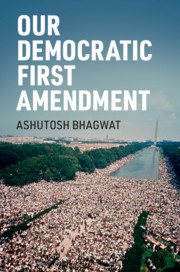Book contents
- Our Democratic First Amendment
- Our Democratic First Amendment
- Copyright page
- Dedication
- Contents
- Acknowledgments
- Introduction
- Part I The Framers’ Democratic First Amendment
- 1 Freedom of Speech and of the Press
- 2 Assembly and Association
- 3 The Petition Clause
- 4 Cognate Rights and Democratic Citizenship
- Part II The Democratic First Amendment in the Age of Twitter
- Index
2 - Assembly and Association
from Part I - The Framers’ Democratic First Amendment
Published online by Cambridge University Press: 28 May 2020
- Our Democratic First Amendment
- Our Democratic First Amendment
- Copyright page
- Dedication
- Contents
- Acknowledgments
- Introduction
- Part I The Framers’ Democratic First Amendment
- 1 Freedom of Speech and of the Press
- 2 Assembly and Association
- 3 The Petition Clause
- 4 Cognate Rights and Democratic Citizenship
- Part II The Democratic First Amendment in the Age of Twitter
- Index
Summary
Chapter 2 discusses the First Amendment right to peaceably assemble and the related right to form associations. In their original proposed constitutional amendments, George Mason and James Madison both included a right “peaceably to assemble to consult for the common good.” Historically the assembly right was a powerful one, entitling the people to gather in public places without prior permission from government officials.Furthermore, even disruptive assemblies were tolerated so long as they did not cross into violence because assembly was recognized as an essential element of popular sovereignty. After all, in an era before electronic communications, physical gatherings were the only way ordinary citizens could exchange and jointly formulate their political beliefs. For similar reasons, the First Amendment has also been long interpreted to protect the right to form permanent associations. This right emerged from efforts during the Washington Administration to suppress the Democratic-Republican Societies, founded to support the French Revolution. Today, the Supreme Court accepts that meaningful citizen participation in government requires stringent protection for associations because it is only through joining groups that individual citizens are able to influence policymaking. The hard question that remains is whether to tolerate discriminatory associations.
Keywords
- Type
- Chapter
- Information
- Our Democratic First Amendment , pp. 43 - 66Publisher: Cambridge University PressPrint publication year: 2020

